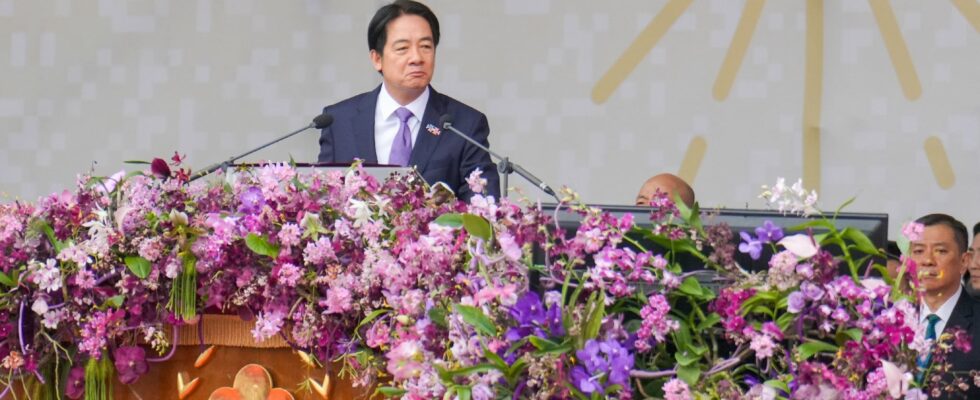Taiwanese President Lai Ching-te pledged, this Thursday, October 10, to “resist the annexation” of the island, comments condemned by China which claims Taiwan as a part of its territory to be reunited one day.
Lai Ching-te, inaugurated in May, gave a speech on the occasion of National Day, an event which raised fears of military maneuvers by Beijing around Taiwan. “I will also maintain the commitment to resist the annexation or encroachment of our sovereignty,” President Lai said outside the Taipei Presidential Palace. Relations between Beijing and Taipei have been terrible since 2016 and the arrival as Taiwanese president of Tsai Ing-wen, then of her successor Lai Ching-te.
Beijing, which describes Lai Ching-te as a “separatist”, has warned that the Taiwanese president’s “provocations” will lead to a “disaster” for his people. “Lai’s provocations of seeking ‘independence’ are causing problems for peace and stability across the Taiwan Strait and will bring disaster to the people of Taiwan,” Chen Binhua said. spokesperson for China’s Taiwan Affairs Office, in a message posted on social media by the office. Earlier in the day, Chinese Foreign Ministry spokesperson Mao Ning condemned Lai Ching-te’s speech, saying it “revealed (…) his sinister intention to escalate tensions in Taiwan Strait due to personal political interests.
“Our determination to defend our national sovereignty remains unchanged”, as do “our efforts to maintain the status quo of peace and stability in the Taiwan Strait” located between the island and China, for his part assured Lai Ching-te Thursday. Beijing has intensified its military and political pressure on Taiwan in recent years. He never gave up using military force to regain control. It has organized three series of large-scale maneuvers in the past two years, using its air force and navy to encircle the island. Beijing also sends warships and fighter planes to patrol the surrounding area almost daily.
Taiwan on alert
According to a senior US official interviewed on Wednesday, China could use the Taiwanese celebrations on Thursday to justify the conduct of military exercises. Even if we have not observed any military activity or significant maneuvers following previous speeches on October 10 (for the national holiday, editor’s note), we are prepared that Beijing may choose to use it as a pretext this year,” said this source to the press.
On Wednesday, a senior security official told AFP that Taiwan was on alert due to Chinese maneuvers nearby that had resulted in “several maritime deployments.” Twenty-seven Chinese military planes and nine Chinese naval vessels were identified around the island in the space of 24 hours, from Wednesday to Thursday, the Taiwanese Ministry of Defense said on the morning of the National Day.
The celebrations mark the 113th anniversary of the overthrow of the Qing dynasty and the founding of the Republic of China. Among the foreign guests are three members of the United States Congress and representatives of several of the 12 states still maintaining diplomatic relations with Taiwan, including Tuvalu Prime Minister Feleti Teo. Washington has recognized Beijing to the detriment of Taipei as a legitimate power since 1979, but remains Taiwan’s most powerful ally and its main arms supplier.
Disputes between Beijing and Taipei date back to the long and deadly civil war which pitted communist fighters led by Mao Tse-tung against the nationalist forces of Chiang Kai-shek. Defeated by the communists, who founded the People’s Republic of China on October 1, 1949, the nationalists of the Republic of China took refuge with many civilians in Taiwan, one of the only parts of the national territory then not conquered by Mao’s forces. Tse-tung. Taiwan has since had its own government, army and currency.
In his speech, President Lai said he hoped for “healthy and peaceful dialogue and exchanges” with Beijing, further urging it to use its influence to put an end to conflicts affecting the Middle East and Ukraine. Noting a “softened tone” compared to Lai Ching-te’s inauguration speech, Fang-yu Chen, assistant professor of political science at Soochow University in Taipei, believes that the references made to the history of the Republic of China when it speaks risks attracting the wrath of Beijing. “This emphasis could provoke Beijing, since it suggests that Lai is claiming control of the historical narrative,” judges Fang-yu Chen.
